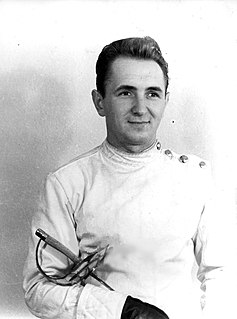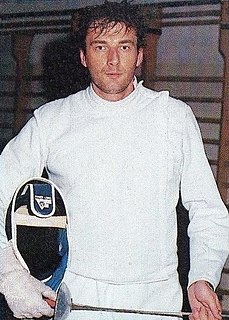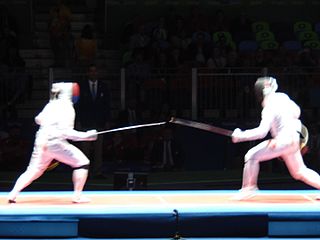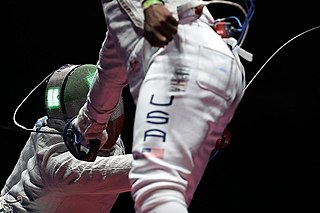
The men's épée was one of eight fencing events on the fencing at the 1964 Summer Olympics programme. It was the fourteenth appearance of the event. The competition was held from October 18 to 19 1964. 65 fencers from 25 nations competed. Each nation was limited to three fencers. The event was won by Grigory Kriss of the Soviet Union, the nation's first gold medal in the event after a bronze four years earlier. The Soviets also took bronze, with Guram Kostava finishing in third place. Between the two was silver medalist Bill Hoskyns of Great Britain; it was the second consecutive Games with a British silver medalist in the event. Italy's six-Games gold medal streak in the men's individual épée ended with the nation missing the podium entirely; Gianluigi Saccaro finished fourth after losing the bronze-medal barrage to Kostava.

The men's sabre was one of eight fencing events on the fencing at the 1964 Summer Olympics programme. It was the fifteenth appearance of the event. The competition was held from October 19 to 20, 1964. 52 fencers from 21 nations competed. Nations had been limited to three fencers each since 1928. The event was won by Tibor Pézsa, the final of nine straight Games in which a Hungarian fencer won the event. The silver medal went to Claude Arabo of France, with Umyar Mavlikhanov of the Soviet Union taking bronze.

The men's épée was a competition in fencing at the 2004 Summer Olympics in Athens. A total of 37 men from 21 nations competed in this event. Each nation was limited to 3 fencers. Competition took place in the Fencing Hall at the Helliniko Olympic Complex on August 17. The event was won by Marcel Fischer of Switzerland, the nation's first victory in the event and first medal of any color since 1952. Wang Lei's silver was China's first medal in the men's individual épée. Defending champion Pavel Kolobkov earned bronze, finishing a set of three different-colored Olympic medals in the event. Kolobkov was the fourth man to earn three medals in the event and had the best record of any of the four; only Ramón Fonst had more individual Olympic success in the men's épée. It was the fifth consecutive Games in which a Russian fencer reached the podium, including medals for Russian fencers competing for the Soviet Union (1988) and Unified Team (1992).

The men's foil was a competition in fencing at the 2004 Summer Olympics in Athens. A total of 36 men from 20 nations competed in this event. Nations had been limited to three fencers each since 1928. Competition took place in the Fencing Hall at the Helliniko Olympic Complex on August 16. The event was won by Brice Guyart of France, the nation's ninth victory in the men's foil. Italy took the other two medals, with Salvatore Sanzo earning silver and Andrea Cassarà winning the bronze medal match.

The men's sabre was a competition in fencing at the 2004 Summer Olympics in Athens. A total of 39 men from 21 nations competed in this event. Nations had been limited to three fencers each since 1928. Competition took place in the Fencing Hall at the Helliniko Olympic Complex on August 14. The event was won by Aldo Montano of Italy, the nation's first victory in the men's sabre since 1920. Montano accomplished what his grandfather and father, both world champions in the individual event and Olympic medalists in the team competition, had not been able to: Olympic gold in the individual event. Zsolt Nemcsik of Hungary took silver while Vladislav Tretiak earned Ukraine's first medal in the event with his bronze. France's five-Games medal streak ended.

The men's sabre fencing competition at the 2008 Summer Olympics in Beijing took place on August 12 at the Olympic Green Convention Centre. There were 40 competitors from 21 nations. The event was won by Zhong Man of China, the nation's first medal in the men's sabre. Nicolas Lopez's silver put France back on the podium after a one-Games absence. Mihai Covaliu of Romania became the 13th man to win multiple medals in the event, adding a bronze to his 2000 gold medal.

The men's épée was one of seven fencing events on the Fencing at the 1928 Summer Olympics programme. It was the seventh appearance of the event. The competition was held from 6 August 1928 to 7 August 1928. 59 fencers from 22 nations competed. Each nation could have up to three fencers. The event was won by Lucien Gaudin of France, the nation's third victory in the individual men's épée—taking sole possession of most among nations above Cuba and Belgium, each at two. Gaudin was the second man to win both the foil and épée events at a single Games. It was the third consecutive Games at which France reached the podium in the event. Two Frenchman had reached the head-to-head final; Gaudin won over Georges Buchard, who received silver. Bronze in 1928 went to American George Calnan, the nation's first medal in the event.

The men's sabre was one of eight fencing events on the fencing at the 1968 Summer Olympics programme. It was the sixteenth appearance of the event. The competition was held from 16 to 17 October 1968. 40 fencers from 16 nations competed. Nations had been limited to three fencers each since 1928. The event was won by Jerzy Pawłowski of Poland, breaking a nine-Games string of Hungarian victories in the event. Hungary's best result in the event was Tibor Pézsa's bronze; Pézsa beat Pawłowski in the final pool but the Hungarian lost two other bouts while the Pole was otherwise flawless. Mark Rakita of the Soviet Union lost only to Pawłowski in the final pool, forcing another bout to break the tie between them for gold and silver; that barrage bout was decided by a single point as Pawłowski beat Rakita 5–4.

The men's sabre was one of eight fencing events on the fencing at the 1976 Summer Olympics programme. It was the eighteenth appearance of the event. The competition was held from July 21 to 22, 1976. 46 fencers from 18 nations competed. Nations had been limited to three fencers each since 1928. The event was won by Viktor Krovopuskov of the Soviet Union, the nation's second consecutive victory in the men's sabre. The Soviet Union's two gold medals in the event moved it out of a six-way tie into sole possession of second place all-time, after Hungary with 11. The Soviet team swept the men's sabre medals in 1976, with Vladimir Nazlymov taking silver and Viktor Sidyak bronze. It was the third sweep in the event. Nazlymov and Sidyak were the eighth and ninth men to win multiple medals in the event. Excluding matches against each other, the three Soviets went 48–3 during the tournament. For the first time since 1900, Hungary competed in the men's sabre but did not win a medal.

The men's sabre was one of eight fencing events on the fencing at the 1980 Summer Olympics programme. It was the nineteenth appearance of the event. The competition was held from 24 to 25 July 1980. 30 fencers from 12 nations competed. Nations had been limited to three fencers each since 1928. The event was won by defending champion Viktor Krovopuskov of the Soviet Union, the nation's third consecutive victory in the event. Krovopuskov was the third man to successfully defend a sabre title and the 10th man to win two medals of any color in the event. His teammate Mikhail Burtsev took silver. Imre Gedővári's bronze medal returned Hungary to the podium after a one-Games absence broke an eleven-Games streak.

The men's épée was one of ten fencing events on the fencing at the 2000 Summer Olympics programme. It was the twenty-third appearance of the event. The competition was held on 16 September 2000. 42 fencers from 22 nations competed. Each nation was limited to three fencers. The event was won by Pavel Kolobkov of Russia, the nation's second consecutive victory in the men's individual épée. Russia joined a five-way tie for third-most gold medals in the event at two. Kolobkov, who had a silver medal in 1992 representing the Unified Team, was the 11th man to win multiple medals in the event. France's Hugues Obry took silver in Sydney, returning France to the podium after a one-Games absence snapped a four-Games medal streak. Lee Sang-ki earned South Korea's first medal in the event with his bronze.

The men's sabre was one of eight fencing events on the fencing at the 1988 Summer Olympics programme. It was the twenty-first appearance of the event. The competition was held from 22 to 23 September 1988. 40 fencers from 18 nations competed. Nations had been limited to three fencers each since 1928. The event was won by defending champion Jean-François Lamour of France, the fourth man to successfully defend an Olympic title in the sabre and the 11th man overall to win multiple medals in the event. It was France's third victory in the event, matching the Soviet Union for second-most all-time. Janusz Olech took silver, Poland's first medal in the event since 1968. Italian Giovanni Scalzo earned bronze.

The men's sabre was one of eight fencing events on the fencing at the 1992 Summer Olympics programme. It was the twenty-second appearance of the event. The competition was held on 2 August 1992. 44 fencers from 19 nations competed. Nations had been limited to three fencers each since 1928. The event was won by Bence Szabó of Hungary, the nation's first victory in the men's sabre since 1964 and 12th overall. Marco Marin took silver while Jean-François Lamour finished with the bronze. Lamour, who had won gold in 1984 and 1988, was unable to win a third title but still became only the second man with three medals in the event. Marin had also finished second in 1984; he was the 12th man with multiple medals in the sabre.

The men's épée was one of ten fencing events on the fencing at the 1996 Summer Olympics programme. It was the twenty-second appearance of the event. The competition was held on 20 July 1996. 45 fencers from 21 nations competed, a sharply reduced number from prior Games which generally had 60 to 80 fencers. Each nation remained limited to 3 fencers in the event. The event was won by Aleksandr Beketov of Russia, the nation's first victory and first medal in the event in its debut. Iván Trevejo's silver was Cuba's first medal in the event since Ramón Fonst won the first two gold medals in 1900 and 1904. The bronze went to Géza Imre of Hungary, that nation's first medal in the men's individual épée since 1980. France's four-Games podium streak ended.

The men's foil was one of ten fencing events on the fencing at the 1996 Summer Olympics programme. It was the twenty-second appearance of the event. The competition was held on 22 July 1996. 45 fencers from 19 nations competed. Nations had been limited to three fencers each since 1928. The event was won by Alessandro Puccini of Italy, the nation's eighth victory in the men's foil. France took the other two medals, with Lionel Plumenail earning silver and Franck Boidin winning the bronze medal match.

The men's sabre was one of ten fencing events on the fencing at the 1996 Summer Olympics programme. It was the twenty-third appearance of the event. The competition was held on July 21, 1996. 43 fencers from 20 nations competed. Nations had been limited to three fencers each since 1928. The event was won by Stanislav Pozdnyakov, prevailing over silver medalist Sergey Sharikov in an all-Russia final. The medals were the first for Russia as an independent nation, separate from the Soviet Union, in the men's sabre. Damien Touya of France won the bronze medal bout, extending France's podium streak to four Games.

The men's foil was one of ten fencing events on the fencing at the 2000 Summer Olympics programme. It was the twenty-third appearance of the event. The competition was held on 20 September 2000. 40 fencers from 22 nations competed. Nations had been limited to three fencers each since 1928. The event was won by Kim Yeong-Ho of South Korea, the first Asian man to win an Olympic fencing title. Ralf Bißdorf of Germany took silver, the first medal for united Germany since 1928. Dmitry Shevchenko's bronze medal was Russia's first as an independent nation in the event.

The men's épée competition in fencing at the 2016 Summer Olympics in Rio de Janeiro was held on 9 August at the Carioca Arena 3. There were 38 competitors from 20 nations. South Korea's Park Sang-young won the individual gold, the first victory for South Korea in the event after bronze medals in 2000 and 2012. Géza Imre took silver, Hungary's first medal in the event since 1996. Imre, at age 41, was the oldest individual fencing medalist since 1952. Gauthier Grumier of France earned bronze.
The men's foil competition in fencing at the 2016 Summer Olympics in Rio de Janeiro was held on 7 August at the Carioca Arena 3. The medals were presented by Paul Tergat, IOC member, Kenya and Donald Anthony Jr., Executive Board Member of FIE. There were 35 competitors from 19 nations. The event was won by Daniele Garozzo of Italy, the nation's ninth victory in the men's foil and first since 1996. The silver medalist was American Alexander Massialas, earning the United States' first medal in the event since 1960. Timur Safin of Russia took bronze.

The men's sabre competition in fencing at the 2016 Summer Olympics in Rio de Janeiro was held on 10 August at the Carioca Arena 3. There were 32 competitors from 25 nations. The event was won by Áron Szilágyi of Hungary, the fourth man to successfully defend an Olympic title in the sabre and 14th to win multiple medals of any color. It was Hungary's 14th gold medal in the event, half of all possible. Daryl Homer earned the United States' first medal in the event since 1984 with his silver, while Kim Jung-hwan took South Korea's first individual men's sabre medal ever with his bronze.



















